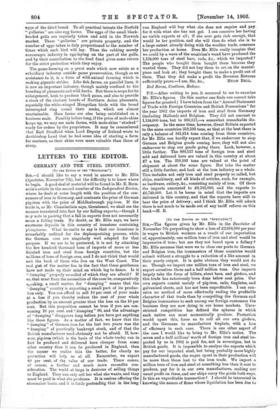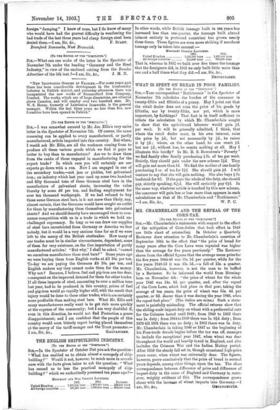[TO THE EDITOR OF THE "SPECTATOR:] Sin,—The figures given by
Mr. Ellis in the Spectator of November 7th purporting to show a loss of £2,654,000 per year in wages to British workers as a result of our importation of, approximately, one million tons of iron and steel would be impressive if true; but are they not based upon a fallacy ? Mr. Ellis assumes that were we to close our ports to German and Belgian iron, the ironmasters of those countries would submit without a struggle to a reduction of a like amount in their yearly output. It is quite obvious they would not do so. Though we import one million tons of iron and steel, we export ourselves three and a half million tons. Our imports largely take the form of billets, sheet bars, and girders, and this trade has notoriously been done below cost price. Our own exports consist mainly of pig-iron, rails, tinplates, and galvanised sheets, and has not been unprofitable. I can con- ceive no method of more effectually ending the profitable character of that trade than by compelling the German and Belgian ironmasters to seek among our foreign customers the business they are now doing in our home markets. Unre- stricted competition has defined the spheres in which each nation can most economically produce. Protection would upset this, force us to roll all our own girders, and the Germans to manufacture tinplate, with a loss of efficiency in each case. There is one other aspect of the case I would like to bring to Mr. Ellis's notice. The seven and a half millions' worth of foreign iron and steel im- ported by us in 1902 is paid for, not in sovereigns, but in British goods. It is impossible to analyse the exports which pay for our imported steel, but being probably more highly manufactured goods, the wages spent in their production will be more than those lost to the iron trade. We import a million tons of iron and steel at something less than it cost to produce, pay for it in our own manufactures, making our usual profit on these, and our ships carry the goods both ways. Is this an unprofitable transaction ? I should be interested in knowing the names of firms whose liquidation has been due to foreign "dumping." I know of none, but I do know of many who would have had the gravest difficulty in weathering the bad trade of the last three years had cheap foreign steel been
denied them.—I am, Sir, &c., F. SCARP. Bromford Ironworks, West Bromwich.















































 Previous page
Previous page